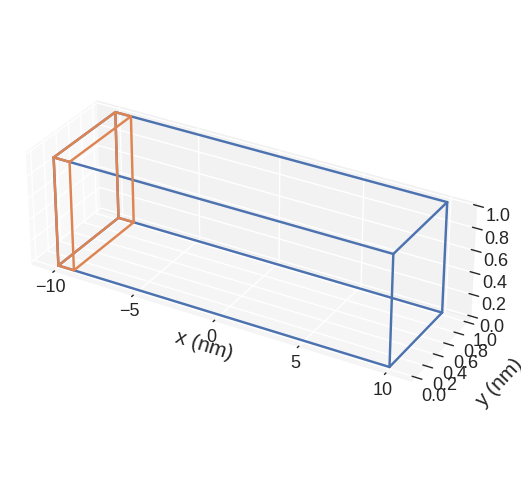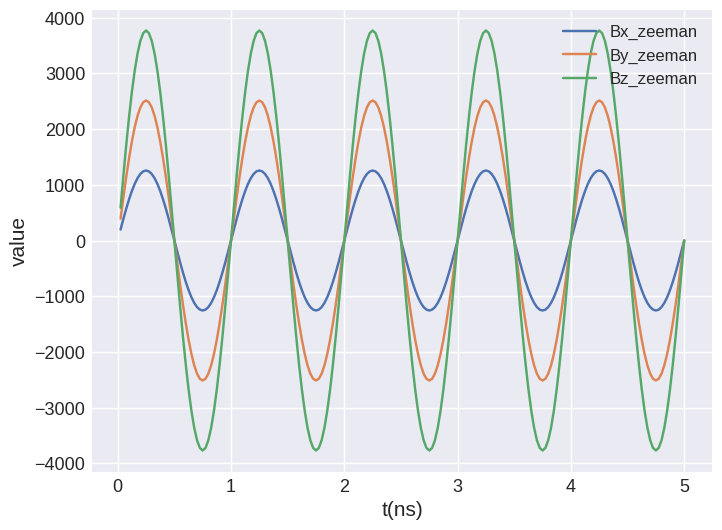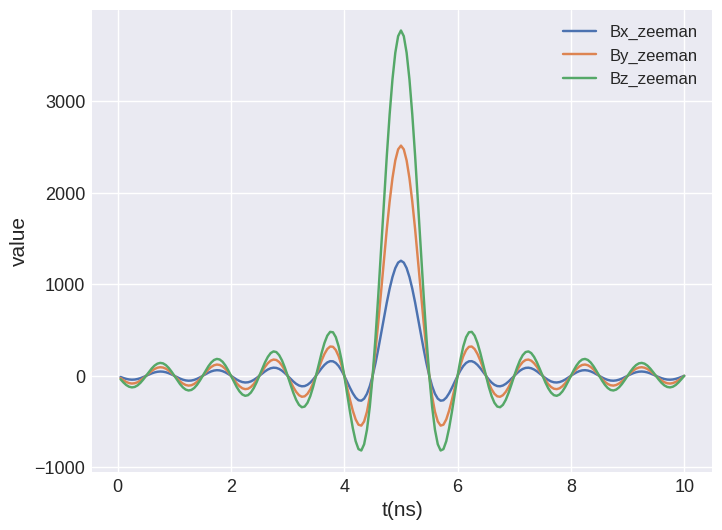Time-varying field#
In this tutorial, we introduce how a time-dependent external magnetic field can be defined in energy equation. We start by importing the modules we are going to use:
[1]:
import oommfc as mc
import discretisedfield as df
import micromagneticmodel as mm
For the sample, we choose a one-dimensional chain of magnetic moments.
[2]:
p1 = (-10e-9, 0, 0)
p2 = (10e-9, 1e-9, 1e-9)
cell = (1e-9, 1e-9, 1e-9)
region = df.Region(p1=p1, p2=p2)
mesh = df.Mesh(region=region, cell=cell)
The mesh is:
[3]:
mesh.mpl(box_aspect=(10, 3, 3))

Now, we can define the system object and add a time-dependent sine-wave field to our energy equation. We need to pass:
Field
Hwhich is multiplied by time-dependent function at each time step,wave shape
func='sin'frequency
f, andtime shift
t0.
Accordingly, the time-dependent Zeeman field is then:
[4]:
system = mm.System(name="time_dependent_field")
system.energy = mm.Exchange(A=1.6e-11) + mm.Zeeman(
H=(1e6, 2e6, 3e6), func="sin", f=1e9, t0=1e-9
)
system.dynamics = mm.Precession(gamma0=mm.consts.gamma0) + mm.Damping(alpha=1e-5)
system.m = df.Field(mesh, nvdim=3, value=(0, 0, 1), norm=1.1e6)
Now, we can run the simulation using TimeDriver:
[5]:
td = mc.TimeDriver()
td.drive(system, t=5e-9, n=200)
Running OOMMF (ExeOOMMFRunner)[2023/10/23 16:03]... (2.3 s)
In the system table, there are columns with field values:
[6]:
system.table.data
[6]:
| E | E_calc_count | max_dm/dt | dE/dt | delta_E | E_exchange | max_spin_ang_exchange | stage_max_spin_ang_exchange | run_max_spin_ang_exchange | E_zeeman | ... | By_zeeman | Bz_zeeman | iteration | stage_iteration | stage | mx | my | mz | last_time_step | t | |
|---|---|---|---|---|---|---|---|---|---|---|---|---|---|---|---|---|---|---|---|---|---|
| 0 | -1.297563e-20 | 25.0 | 4.434031e+03 | -5.147568e-10 | -1.812700e-21 | 0.0 | 0.0 | 0.0 | 0.0 | -1.297563e-20 | ... | 3.931627e+02 | 5.897440e+02 | 3.0 | 3.0 | 0.0 | 0.758989 | 0.183653 | 0.624666 | 3.515634e-12 | 2.500000e-11 |
| 1 | -2.562001e-20 | 56.0 | 8.766104e+03 | -4.954602e-10 | -1.204656e-21 | 0.0 | 0.0 | 0.0 | 0.0 | -2.562001e-20 | ... | 7.766444e+02 | 1.164967e+03 | 9.0 | 5.0 | 1.0 | 0.090633 | -0.038564 | 0.995137 | 2.425770e-12 | 5.000000e-11 |
| 2 | -3.759093e-20 | 105.0 | 1.290846e+04 | -4.636140e-10 | -1.221901e-21 | 0.0 | 0.0 | 0.0 | 0.0 | -3.759093e-20 | ... | 1.141003e+03 | 1.711504e+03 | 17.0 | 7.0 | 2.0 | 0.784284 | 0.261449 | 0.562622 | 2.631440e-12 | 7.500000e-11 |
| 3 | -4.863542e-20 | 184.0 | 1.673341e+04 | -4.207088e-10 | -6.112468e-22 | 0.0 | 0.0 | 0.0 | 0.0 | -4.863542e-20 | ... | 1.477265e+03 | 2.215898e+03 | 30.0 | 12.0 | 3.0 | 0.015202 | -0.010857 | 0.999825 | 1.449728e-12 | 1.000000e-10 |
| 4 | -5.848036e-20 | 299.0 | 2.014752e+04 | -3.675974e-10 | -2.915541e-22 | 0.0 | 0.0 | 0.0 | 0.0 | -5.848036e-20 | ... | 1.777153e+03 | 2.665730e+03 | 48.0 | 17.0 | 4.0 | 0.497085 | -0.051994 | 0.866143 | 7.913664e-13 | 1.250000e-10 |
| ... | ... | ... | ... | ... | ... | ... | ... | ... | ... | ... | ... | ... | ... | ... | ... | ... | ... | ... | ... | ... | ... |
| 195 | 4.436379e-20 | 20614.0 | 1.906705e+04 | -3.837992e-10 | -2.268306e-22 | 0.0 | 0.0 | 0.0 | 0.0 | 4.436379e-20 | ... | -1.477265e+03 | -2.215898e+03 | 3450.0 | 15.0 | 195.0 | -0.020176 | -0.114665 | 0.993199 | 5.918021e-13 | 4.900000e-09 |
| 196 | 3.422674e-20 | 20687.0 | 1.474584e+04 | -4.221479e-10 | -5.046823e-22 | 0.0 | 0.0 | 0.0 | 0.0 | 3.422674e-20 | ... | -1.141003e+03 | -1.711504e+03 | 3463.0 | 12.0 | 196.0 | 0.848044 | 0.209072 | 0.486939 | 1.197700e-12 | 4.925000e-09 |
| 197 | 2.328011e-20 | 20742.0 | 1.004530e+04 | -4.502211e-10 | -1.083878e-21 | 0.0 | 0.0 | 0.0 | 0.0 | 2.328011e-20 | ... | -7.766444e+02 | -1.164967e+03 | 3473.0 | 9.0 | 197.0 | 0.063640 | -0.149399 | 0.986727 | 2.412896e-12 | 4.950000e-09 |
| 198 | 1.178128e-20 | 20779.0 | 5.087140e+03 | -4.673789e-10 | -2.358762e-21 | 0.0 | 0.0 | 0.0 | 0.0 | 1.178128e-20 | ... | -3.931627e+02 | -5.897440e+02 | 3480.0 | 6.0 | 198.0 | 0.822805 | 0.116178 | 0.556322 | 5.059389e-12 | 4.975000e-09 |
| 199 | 6.088592e-34 | 20804.0 | 2.629445e-10 | -4.731610e-10 | -2.217703e-21 | 0.0 | 0.0 | 0.0 | 0.0 | 6.088592e-34 | ... | -2.032019e-11 | -3.048028e-11 | 3485.0 | 4.0 | 199.0 | -0.041748 | -0.107200 | 0.993361 | 4.687671e-12 | 5.000000e-09 |
200 rows × 22 columns
[7]:
system.table.mpl(y=["Bx_zeeman", "By_zeeman", "Bz_zeeman"])

Similarly, we can define a cardinal sine wave (“sinc pulse”). We need to pass:
Field
Hwhich is multiplied by time-dependent function at each time step,wave shape
wave='sinc'cut-off frequency
f, andtime shift
t0.
Accordingly, the time-dependent Zeeman field is then:
[8]:
system = mm.System(name="time_dependent_field")
system.energy = mm.Exchange(A=1.6e-11) + mm.Zeeman(
H=(1e6, 2e6, 3e6), func="sinc", f=1e9, t0=5e-9
)
system.dynamics = mm.Precession(gamma0=mm.consts.gamma0) + mm.Damping(alpha=1e-5)
system.m = df.Field(mesh, nvdim=3, value=(0, 0, 1), norm=1.1e6)
td = mc.TimeDriver()
td.drive(system, t=10e-9, n=200)
system.table.mpl(y=["Bx_zeeman", "By_zeeman", "Bz_zeeman"])
Running OOMMF (ExeOOMMFRunner)[2023/10/23 16:03]... (1.3 s)



